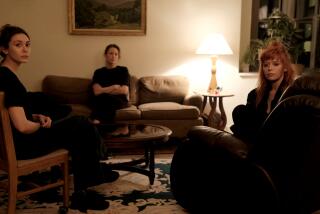Critic’s Pick: HBO’s ‘Togetherness’ is lovely, lovely, lovely
“Togetherness” (HBO, Sundays). As the home of “The Sopranos,” HBO helped usher in an age of brawny, brawling, dark-humored, foul-mouthed, sprawling series that seemed to define 21st-century “quality” television, a commercial-aesthetic predilection that has informed the networks’ dramas and comedies alike.
At the same time, it regularly returns to a strain of delicately constituted programs, whose sensibilities derive more from independent film and whose view of human nature is at least guardedly hopeful: series like Mike White’s “Enlightened,” Dolly Wells and Emily Mortimer’s “Doll and Em” and Mark and Jay Duplass’ “Togetherness,” whose second season began last Sunday. A story about people on their way to becoming … better people, it’s a study of human possibility rather than, as is so often the case in cable, depravity.
The first season made housemates of four adults (and two small children) in transitional Eagle Rock (upscale, but not too upscale): Brett (Mark Duplass), a sound editor in the movies; his wife Michelle (Melanie Lynskey), unsatisfied in a marriage not so much on the rocks as stuck in the shallows; Brett’s best friend Alex, an unemployed actor (Steve Zissis, who also sports a co-creator credit); and Michelle’s sister, Tina (Amanda Peet), who has moved west from Texas and, though still looking very much like Amanda Peet, is racing against time in life and love.
This season, which finds Brett jobless and Alex working, Michelle trying to establish a charter school, and Tina living with Peter Gallagher, scatters and rearranges them, though “Togetherness” remains an apt title. Where Lynskey, a reactive raw nerve who never overplays, was very much the heart of the first season – and is still pretty close to the heart of this one – her costars all make themselves felt on their character’s separate, intersecting journeys.
If it is sometimes “like a movie,” with a few dramatic moves that might have fueled a Frank Capra film, and a willingness to be a little fantastic to make an emotional point, or to underscore the magic that is fleeting life, well, that’s why we watch movies, instead of just home movies. The challenges they face are familiar ones, cut to ordinary human scale, but it’s all very compelling; I watched nearly the whole eight-episode season in a single sitting. As in life, conflict resolution often comes down to people speaking in a normal tone of voice, or not talking, or just embracing what’s obvious and unstated, which makes it no less powerful. Lovely, lovely, lovely.
Follow Robert Lloyd on Twitter @LATimesTVLloyd
More to Read
The complete guide to home viewing
Get Screen Gab for everything about the TV shows and streaming movies everyone’s talking about.
You may occasionally receive promotional content from the Los Angeles Times.







